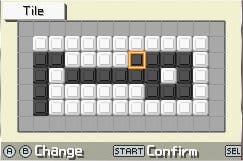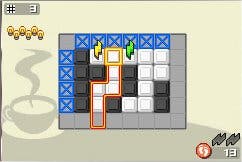Polarium Advance
A lovely way to fill the minutes.
Polarium Advance is designed to be played every day. Not just "for as long as it's fun"; every day. The idea is to stick it in your GBA cartridge slot and turn it on every so often. Every day is filled with dead time; Polarium Advance's goal is to fill it. It's the Times crossword. It's a Sudoku puzzle. It's picking at the flap of your shoe. It's concentration and deduction rather than instinct, persistence or digital agility.
The main mode, Daily Polarium, is 365 puzzles. You set today's date and then get going. Completed puzzles unlock more of the calendar. Each puzzle is about making horizontal lines of matching tiles. You do this by snaking a line over the top of them using the d-pad, occasionally overflowing into the margin if you need to, and then hitting A to change the colour of the tiles you've selected from black to white or white to black. If you clear the grid, you solve the puzzle. If you don't, you try again.
When you're done, you're given a rating based on whether you met the two puzzle conditions - to complete it within a certain number of steps (i.e. covering a certain number of squares), and to start and stop in certain places. The specifics of the two conditions are unknown to you the first time you attempt a puzzle, but are revealed on a subsequent visit. As such, even an easy puzzle can become a bit of a challenge as you carefully weigh up which way to move, and triumph can turn bitter in an A-button instant when you realise you've used the right number of steps and started and ended in the right place, but still have an errant white tile in a line of blacks.

Extra challenge comes from the use of hurdle, multi and solid tiles. Hurdles are the peskiest - areas of the margin crossed out and unusable, changing the boundaries of the puzzle and forcing you to convert tiles you might otherwise skirt around. Multis are a relatively lovable, counting as either colour depending on what else is present on the horizontal they occupy. Solids, meanwhile, disappear first to allow other blocks to fall into their spaces - as often exposing heart-breaking failure as heart-lifting success.
Once it gets into a rhythm, Daily Polarium is the sort of back-of-the-newspaper, ballpoint-pen-scrawl puzzle game that sharpens the brain and tempts you to pick a tube journey with as many obscure line-changes and platforms to sit down on as possible. It's not the sort of game I can sit and play for hours on end without provoking an aneurysm (although, given that I only got my copy last week, it was perhaps my editor's desire to provoke one in me), but it is the sort of thing that, should you carry your DS or GBA around in a bag or pocket, can rest easily in the cartridge slot with little fear of removal. There's even a mode to create custom puzzles to set upon your friends, which ought to appeal to the digital Morse in all of us.
It is, of course, a follow-up to Polarium for the Nintendo DS, which offered a similar array of puzzles to complete, and like the DS game it also has a fast-as-you-can mode designed to appeal to those who cycle harder than they have to and can't walk down a street without wanting to run to the end. But whereas the DS game's Challenge mode drew criticism in the way it asked you to solve an ever-evolving puzzle using the stylus, the GBA Time Attack is relatively sedate (and much less seditious). The idea is to complete a sequence of puzzles against the clock to improve your ranking - initially you'll cruise and panic in equal measure, but in the long run you'll probably find it helps you concentrate more under pressure. Or yearn to kill hookers, I suppose - I'm never sure which effect games are meant to have.

The puzzles here are the sorts of things most people will happily pick away at every day without trying to blitz the whole lot, gradually becoming more complicated and consequently rewarding as you progress through the weeks and months. Perhaps in the future, when we're all flying to work in upside down trains, petrol's kept in museums and my Beyoncé clone machine works, we'll find ourselves completing little electronic puzzles like these on the back of wacky futuristic newspapers. Built into the price of your daily dose of words, it'd probably make the deal.
In the meantime, you need to decide if it's worth £25, and fortunately for my weary fingers it's a question you don't need me to answer. Although puzzle fans will delight in the genius behind the way things fall into place, universally speaking Polarium Advance is sit-ups for the brain - and its appeal to you will reflect how much you like straining the bit between your ears.
Those who enjoy it most will obviously exhaust it the quickest, but for me it's worth it whether you rush through it or just pick at it from time to time. And, since we've touched on the subject, anybody who gets on with it will also adore Brain Training. Puzzle fans bored of sliding tiles as quickly as possible will enjoy the change of pace.

